#specially because THIS topic in particular is not a matter of opinions
Text
Befriending Spock Headcanons
My first Star Trek content! Spock is my favorite character by far and I feel like he needs some love. A lot of my Star Trek content will be romantic, but I feel like especially with Spock, it's necessary to explore the first steps of just becoming friends, because it's harder to break down his walls and he's not one to just act on attraction at first sight.
Warnings: none
Word count: 1.1 k
- People have very different, often very polarizing opinions on Commander Spock. You'd heard more than enough stories about how cold, calculating, unforgiving, and inhuman he was.
- But when you met him, all you could think was that he was so cool.
- He was incredibly intelligent, capable of making smart and informed decisions regarding basically any situation that affected the ship in minutes, and always acted with absolute certainty. Despite that, he did not want a command of his own and readily accepted his own mistakes, readjusting accordingly. What was there not to admire?
- You tried your best to be friendly, but you knew it was a long shot. Not only was he a Vulcan, he was your commanding officer. You weren't sure how he regarded any sort of personal relationship, really.
- Still, you found yourself engaging him in light conversation in the halls, the mess hall, or the lift. You broke it off quickly if it didn't seem like he wanted to talk, which surprisingly was very infrequent. If you got him talking about science, or the history and philosophy of Vulcan, it was quite easy to get him to talk.
- Spock is... I'm not sure how he would describe it, but I suppose, pleasantly surprised to find someone that not only tolerates his discussion of such topics, but actively pursues them.
- Whether you know it or not, you've chosen the most effective method of breaking the ice.
- Spock encourages this by consulting you on data that is outside of the normal scope of your duties as often as possible. He enjoys being challenged, and surmises that you must, as well. You have a natural curiosity and a scientific mind, one that with proper training could even attain his level of authority in time. These discussions don't feel like replacement training sessions so much as informal academic chatter, though.
- Spock starts to show that he considers you a friend through verbal encouragement first. It's often very dry and hard to detect, but it's there.
- He once corrected you regarding a postulation you'd made when analyzing some data that was adjacent to your field. You said, "Oh, right, that makes more sense. Sorry, I'm a little stupid sometimes," out of habit, something that you knew you should probably grow out of.
- He looked at you, perplexed. "Ensign, you should not insult yourself for being unaware of a highly specialized piece of information that allowed me to see the facts in this particular light. Every scientist, no matter how intelligent, has their blind spots."
- You smiled at his encouragement before raising your eyebrow in doubt. "Even you?"
- Spock hesitated for a moment before considering his ineptitude in handling his friendship with his captain and now, it appeared, you as well. "Of course."
- You didn't believe him, but thought it was sweet of him to say so. "Thanks, Commander."
- "You may call me Mr. Spock, or Spock, if you prefer."
- "Sure thing, Mr. Spock."
- The Mr. gets dropped shortly after.
- Every smile you manage to get out of him is an absolute treasure, as it is very rare. Something tells me that the first smile he gives you would be in a situation in which you are distressed and he is trying to reassure you, perhaps he sustained a nasty injury and you are very concerned. The smile is fleeting and feels a little unnatural, but the effort he put into it was enough to convince you that he would recover. little did you know there was little effort expended--seeing your care for him, it was almost irresistible.
- Every smile you give him is treasured by him, though they are so much more frequent. It is true that humans smile with so little provocation, but it's still nice to know sometimes that he's the reason and not the butt of some joke (looking at you, Kirk and Bones)
- There are two facts about Vulcans that are very relevant to this situation: 1) Vulcans are touch telepaths, meaning that touch is very, incredibly personal and reserved for special situations (except for Sarek and Amanda cuz they're whores), and 2) Vulcans are, in fact, very emotional people.
- Keeping these facts in mind, there must be some way for Spock to express his feelings of appreciation and camaraderie for you, and it cannot be in the average human manner (handshakes, pats on the back, high fives)
- So instead, he takes a more vested interest in your wellbeing, asking if you've eaten, drank water, slept, etc. especially when you've come back from an away mission and are busy analyzing new data.
- You often seem to find each other following each of the Enterprise's adventures. These are often time-sensitive and life-threatening, and as a low-ranking science officer, often your only orders are to stay put and protect yourself.
- The first time or two after you've become friends, you try to hide how shaken you are--you know you're fine, really. You just can't help that your reaction to coming down off the adrenaline high is to literally shake and sometimes cry a bit.
- However, Spock sees through what you're trying to do and reassures you that you are safe. "I know."
- "I intended to convey that you are safe to express any emotions you may currently be experiencing."
- Oh.
- You usually end up sitting with Spock somewhere, your quarters, your lab, the mess hall, the holodeck, shaking and crying before recovering after a bit. The emotional expression always makes Spock a bit uncomfortable--not because he's disgusted by it, but because he doesn't have/doesn't feel comfortable expressing the skills or the emotional intelligence needed to interact with them.
- His simply being there is enough. You recover in 15 minutes or so and can carry on as before.
- "Have you considered consulting Dr. McCoy regarding the management of your anxiety surrounding these events? They seem to cause you a high degree of stress."
- You shrugged. "It's just my body's response, it doesn't bother me," you reassured him. "Besides, I've got you."
- The feeling of being needed in a way not associated with his intelligence or his duty was unexpectedly welcome.
- In time, he comes to take a more active role, bringing you food and water while you're working or offering to make a bit of progress on your work while you take a short rest--Vulcans don't require as much sleep as humans, after all.
- After a while of this, you mention to him that you feel that you could be a more proactive friend, when he takes so much time and effort to look out for you, and ask him what you could do.
- He looks at you, perplexed. "Your presence in my life is quite sufficient," he assures you. "Your companionship proves to be a gratifying part of my daily routine in any measure."
- He has no idea how sweet he can be.
#star trek#star trek tos#star trek aos#star trek the original series#star trek fanfiction#star trek headcanons#star trek spock#spock tos#spock aos#spock x reader#platonic spock
121 notes
·
View notes
Text
Last but not least:
My Rook Hunt rant!
(Long have I been trying to avoid it because, oh boy. This man gives me so little to accept as Canon and so much to speculate.)
Book 5/6 mentions
Rook is such fascinating character. Both in his actions, his design, habits, his mind - Everything. No doubt he's rather odd the way he is, this peculiar little guy with a mind as unique as the spring flower and as mysterious as the universe. Yet, there have been certainly some aspects in game where you can see his distinctive personality and that he's far beyond Savanaclaws natural enemy and #2 Neige Fanboy (reference intended).
For one, I really like to speak a particular moment in-game that has many Neige-"disliker", Rook Fans and Vil Enjoyer on edge:
And everyone be like "Don't let Vil hear", "Vil's not gonna be happy about that one", "Vil about to overblot for a second time" and so on. But there's just so much wrong with it. Because the literal four sentences after that one were:
"But it wasn't Neige himself who moved me. It was all the elements of the show combined that made him shine. There was the music, costumes, and overall design, of course. And the wizard and other cast, members were spectacular-- especially the villains."
Correct me if I'm wrong but isn't Vil the Villain in the show? It would've been perfect crumbs for the RookVil shippers but all they see is "omg, Rook fanboys about Neige." And there's another thing that people deeply seem to hate about Rook:
"He made Vil overblot because he betrayed him!"
He did not. It's not even because I like Rook and justify his actions, it's plain and simply wrong. Rook "betrayed" Vil and NRC sure (although I already gave my opinion about that topic here) but Rook has *not* caused Vils overblot. The story is quite simple: Vil tries to poison Neige -> He gets stopped -> Overblots -> They all perform -> Rook votes for RSA. The End. End of story. No discussion needed. I'm sorry if you can't comprehend the story line but I am not going to discuss over such simple period of time that happened in the matter of a few chapters.
But I'll get to Rooks special love for Neige and Vil later. First I'd like to talk about the eccentric Hunter himself but oh boy, where do I even start? There's so much to unpack, yet there is barely anything to work with.
(I'd like to mention at this point that I find it extremely hilarious that we get the most Rook/Pomefiore lore not in the Book of Pomefiore but literally a Book later during their break in into the Island of Woe and during the Escape out of Tartarus. Like alright, you had your Book but casually Loredrop on us because why the fuck not. We're all about to get royally fucked every turn but you go girl.)
The first time we get to meet Rook is during Book 2 where MC and the Heartslabyul gang tries to protect potential victims of the mysterious destruction. When do we get to see him again? I don't even remember, he just shows up, fucks around and disappears like hepatitis. I think outside of Book 5 and Book 6, the only *real* sight of Rook is in events or Vignettes which mainly imply him bothering the hell out of whoever has his current attention.
We've got Leona being watched by a blushing Rook in Rooks Labcoat Vignette, Malleus who throws an object with insane speed almost directly into his face because Rook was a little too interested in Lilia in his Sports Uniform Vignette, his Ceremonial Robes Vignette was basically him wanting to take a shower in Octavinelle and forcing Floyd to come with him (one of the funniest interactions if you ask me). These are the only cards I own and I'm rather slacking off when it comes to keeping up with all Vignettes and Events, so the only one I can talk about is his Culinary Crucible Vignette where he was pretty much his blushing self while watching Cater doing his thing (Poor Chef who thought Rook was just extremely excited to cook).
All these interactions seemed rather silly to me - Until I watched/read Rooks Halloween Vignette where he talks a little about his childhood: He was a child who struggled greatly to express himself. That was, until his parents took him to watch the fateful Play that was previously mentioned in the screenshot I've shown. That day, he became the person we see now: The dramatic and overly expressive Rook, that could be the prime example of a theater kid.
If we keep this in mind, his actions suddenly make sense: Theater is build on dramatics, exaggeration and poetry. If you struggle to express yourself but learn from something as expressive as acting, it's only natural that you're becoming this overwhelming expressive being we see in Rook. So I personally believe that he has no ill intention when being himself. In fact I believe it's the only way he can express himself and he's mildly smart it about it as well:
He knows that his extroverted nature is overwhelming to introverts such as Leona (for example), so he keeps his distance. Yet, he can't help but admire the beastman for the person he is - So in order to not overwhelm him, he watches from afar. This, on another note, leads to him having this "stalker" being. Though he keeps pushing his luck by ignoring any kind of boundary being put up by anyone (no matter if it's Leona, Ruggie or even Floyd who, in the end, just accepted his fate).
I also believe that him being naturally rather incapable of expressing himself is one part of why we know so little about him. Another part is - in my opinion - that he's purposely hiding. Not in the literal sense but in the way Cater hides himself. Rook is a prime example of "pretending to be overly opened up but in reality it's a facade to hide your real being" (I can promise you, it's an actual psychological thing. I just can't remember the name rn and I'm too lazy to Google it). You'd look at Rook and believe you know everything about him but you barely know how many siblings he has or if his parents are still alive. In fact, the only thing we know is that he has a large (and extremely wealthy) family that is big enough that they barely manage to see each other.
This is where I come to another point: It's a common belief that the Tweels are a Mafia family but I don't think I've ever seen anyone say the same thing about Rook, yet it would make sense. He's a hunter, he knows how to kill (and I don't doubt he did it too), he survived in the most absurd situations in the wild, his observation skills are almost inhumane and his family is much a secret as the pictures behind his wallpaper. I know we, as a fandom, joke about it but has anyone genuinely considered that Rook may or may not have a criminal family? It would certainly explain why he has the vibe of a rough guy yet the behavior of Royalty - Sure, it may also be because he's part of Pomefiore but realistically speaking: You can't tell me that he "fixed" habits he gained during his whole life growing up, then one Model (which is obvious Vil) comes across and suddenly he's the little petite guy. There had to be at least a base growing up that Vil just intensified.
I currently feel like I'm missing half of fhe things I want to say about him, fuck my life.
Ah, there is one thing I'd also like to talk about that people either misinterpret, mischaracterize or ignore: His relationship with Epel. Many view Rook as nothing but Vils little Lap dog, the Chihuahua in his purse if you will - While I can understand that, there's more to him and it's especially showing when Rook is talking with Epel. If Rook would be truly as loyal as Vil would hope him to be, he wouldn't be as nice to Epel as he is. Not only in Book 6 (which is undoubtedly one of the biggest "supportive step dad" moments), we can find Rook multiple times trying to help out dear Farmerboy to adapt to the fancy life in Pomefiore by giving him educated tips and hints without judging him (One specific moment I have in mind is Epels Ceremonial Robes Vignette where Epel struggled to handle the fancy way of eating that was wanted in Pomefiore - Instead of judging Epel like the other pretty boys do, Rook actually tries to help him out). Just had to add this because it's such subtle hint on his nature yet it's such a sweet way.
I feel like I've been missing a few things right now but they won't come to mind, so it is what it is. Since I killed the limit, the HCs are here.
31 notes
·
View notes
Note
Hi! So I am very new to Hadestown and I am watching the bootleg. I really love the dynamic between Hades and Persephone, but there is one thing that kind of rub me in not so good way, is Hey Little Song Bird implied that Hades and Eurydice slept together? I am seeing a lot of interpretation and it genuinely confused the hell out of me asdfghk
Hi! Well, tbf it's a tricky question, but the short answer is that Hadestown suggests that something might have happened behind closed doors. The rest is up to audience and actor's interpretation.
For example, Anaïs Mitchell often mentions in Working On a Song that in early workshops she often went with the idea that Hades cheats and pretty regularly even though these affairs mean nothing to him since the only person he loves is Persephone. It even had a cut song:
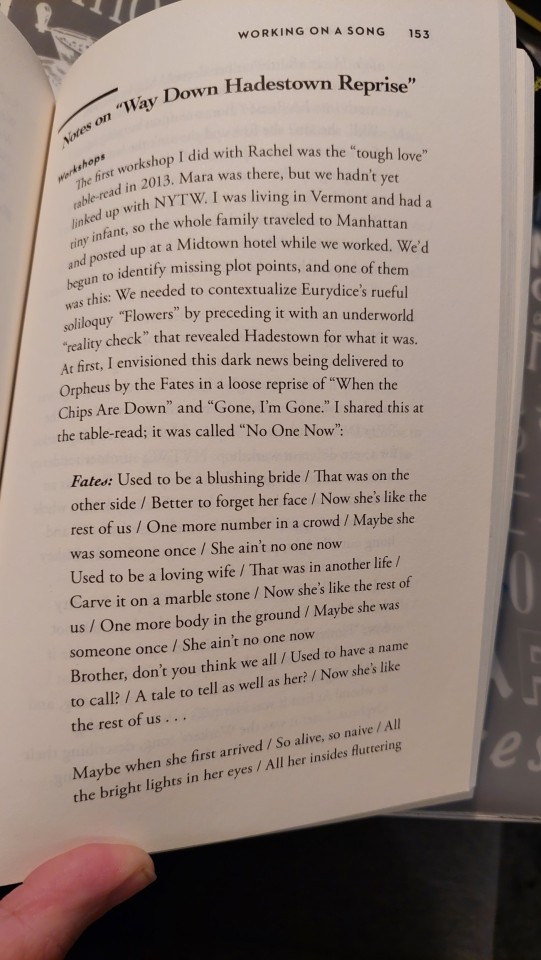
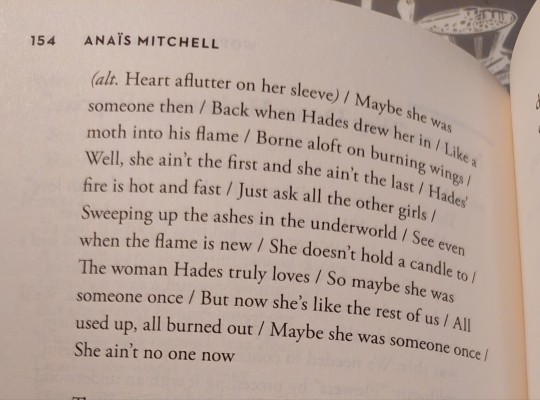
In her early drafts/productions of Hadestown you can often get the vibe that from her point of view it doesn't matter as much because they are eternal beings and love each other since the world began so does it even matter for them?
However, by NYTW this story line was cut apart from Persephone's line in How Long:
"I don't mind if you look at other girls, now and then"
"The girl means nothing to me"
"I know"
Plus the staging in NYTW Papers and Hades' protective peacock behavior with Eurydice around Orpheus in the scene also gives you a thought that they might have had an affair? Plus some bits like the fact that she has a line in Why We Build a Wall and her words "But don't you see? That's different with me!" - "Different than who? They thought they were different too!" Could also be interpreted as Hades suggesting some special conditions by granting her a role of a romantic interest. Whether the interest is real or not and did he use it or not is again up to your interpretation of NYTW Hades. He is more of a morally dubious guy (as all ht Hades are) so it's more up to you to either believe he would have cheated to put Persephone in her place or would just use showing off Eurydice as a brutal way to get Persephone's interest.
As for Broadway, I think it's still suggested and you can find profs in the lyrics but I think that they are what they are - suggestive and leave you to interprete it whichever way you feel comfortable. I think the biggest suggestion remains in Flowers with the line:
'I trembled when he laid me out
"You won’t feel a thing," he said, "when you go down"'
Which kinda can have a death meaning and sex meaning, tbf someone could have written a good article on how those topics are connected in Hadestown. So here, again chose one of the two or both.
But again, Broadway also changed the lyrics in How Long and the whole staging in Papers so it's less suggestive.
My personal opinion based on Broadway production is that it all depends on how the actor plays it and whether you believe this particular Hades is the type to sleep with Eurydice to get Persephone's attention and prove he is still attractive or he is more of a person who doesn't care about having the affair and his only goal is to get Persephone to react somehow by composing such a messed up hurtful plan. Personally, I prefer the second option maybe because I'm a pussy or maybe because I see Hades (whom I mostly base on Patrick Page ht Broadway previews) like a person who is desperate to get Persephone's attention in such a radical way like a cat pushing objects from your table to see your reaction. He wants to be stopped, he wants any reaction from Persephone. He even touches her by the shoulder before going into the office like "Look!! Look! I'm absolutely totally leaving! To cheat! See! Hey come on! I'll even take off my tie to show that I'm serious! Don't you wanna stop me???". Seems kinda way too extra to me. Like he could have just gotten to the office after parading a pretty girl in front of her and it would be understood that it's for an affair. But he takes so much time to make sure she understands that he can find himself someone when all he wants is for her to come back to him with open arms. I'm not sure he has the guts to actually damage his relationship to an irreversible degree (considering Broadway Hades is never stated as a cheater before the Eurydice sub-plot). Like it's one thing to take a mortal before her time and parade her in front of your wife (because what is a mortal life after all?) as a "replacement" and it's the other way to actually cheat on her and deal with the fact that she might never forgive him again if it is a deal-breaker for her considering they seem to be true to each other for all these years.
One interesting thing to note here as well is how Hades actors play the reaction to Persephone's line in How Long:
"He has the kind if love that you and I once had"
Because his instant reaction is "OH SHIT once had?? Does she think I don't love her still?? OH SHIT I BROUGHT THE GIRL THIS IS WHY SHE MIGHT THINK THAT", so he answers to that:
"The girl means nothing to me!"
Depending on the actor and she show the line sounds either scared, confused, angry, undignified etc. So it's once again up to you to interprete why he reacts this way: is he angry because she suggested he would actually cheated on her? Is he angry because she called him out on that affair? Is he confused and scared because she thinks he doesn't love her anymore because of his foolish decision to tease her in such a cruel way?
That's up to you.
P.S. I think one of the most interesting studies of the subject and Hades' character that I've read in a fic for that matter was the Songbird chapter of Winters Nigh and Summers O're. You can check it out, but I will warn you that it's probably one of the heaviest chapters of that fic in the emotional sense and it has explicit parts (don't worry, nothing bad happens to Eurydice. Well...apart from dying, I guess), so check out the warnings if you decide to read it.
#me being me#hadestown#hades#eurydice#persephone#hadestown analysis#i guess#i honestly wanted to reply shortly but then got interested in thinking about the subject and wrote a huge ass post#sorry anon hope you'll enjoy it tho#i do think Songbird chapter is like the most painful ht fic I've read ngl#traumatic but so so good
111 notes
·
View notes
Text
General HC’s for Simon "GHOST" Riley

♱ A/n: don’t get me wrong, I love some good Ghost fluff, but it just feels too OOC for me, so here are my personal head cannons for my hundredth baby daddy🫶 p.s I would just like to mention I still ain’t play the game so my lore isn’t the best but that ain’t stopping me🕺
♱ Warnings: 18+, some nsfw hcs towards the bottom, there is a warning before hand!
⌐╦̵̵̿ᡁ᠊╾━ ♡ ⌐╦̵̵̿ᡁ᠊╾━
♱ this man is fucking mean. He WILL hurt your feelings on occasion, both on purpose and not. He. Does. Not. Give. A. Fuck. Either way.
♱ matter of fact, this mf thinks he is right despite being very VERY in the wrong, and it takes a LOT to get him to admit to being wrong.
♱ STUBBORN AS A OX BRO, his motto is literally “My way or the fucking high way.” No ifs, buts, or in-betweens!!
♱ be prepared to make many, many arguments and still get nowhere on a specific topic. your opinion does not matter for a long time for this man, and takes months of getting around to even thinking about your side of anything.
♱ it would take a long time to get close to this man, like sure he might be down to fuck quite early on, but to be emotionally available in any way other than angrily fucking your brains out is going to take YEARS.
♱ probably isn’t interested in keeping relationships with citizens because he doesn’t want to get wrapped up in his life, lovers, or friends, his position in special forces keeps them all vulnerable
♱ not until recently (being on this new team) does he actually have friends, ghost kept to himself and still does, but after recovering from his betrayal, he would bond with no other teammates and refused to cross any lines with anyone
♱ anger fucking issues- this man has. Like yes, he can control himself in the moment and continue to lead on with the mission, almost acting like your disobedience didn’t even phase him, but OH you better be expecting a whoop-ass reprimanding that will leave you doubting your entire worth and existence
♱ or if a particular enemy is pissing him off, he won’t let his frustrations affect his movements, in fact, it only fuels them, and when he finally gets a hold of em’ there’s nothing left but a bloody pulp of a person
♱ the highest possibility of becoming a friend is being on the team or meeting in a bar when he had been drinking a little bit - both of which you will have to be highly persistent to evoke a reaction
♱ he likes it when people talk to him, which makes him feel less scared and intimidating in public areas. Of course, he likes to keep that vibe when on missions or dealing with interrogations and such, but still out in public. he wants to make people as least uncomfortable as possible, even if his skull baklava is a little intimidating
♱ SPEAKING ON INTERROGATIONS, I know for a fact that this man has committed WAR CRIMES on other men for information, like he totally has it in him to do so, ESPECIALLY, when it’s a a horrible war criminal or sum
♱ he is a metal, heavy metal, grunge, hard rock, kinda guy - don’t deny it. He’s got way too much trauma to not want to blast out his eardrums at every possible chance. He also likes to explore all genres too, like alternative metal, black metal, alternative, alternative rock, etc.
♱ lowkey likes to bond over music, like trading music with the team and talking about it and what they thought when meeting up later.
♱ he likes to sit down and have a cigar with Price every now and then, ofc drinking with him too. They have their own “superiors” moments and talk about how the team is doing and what training could help them for the next mission.
♱ almost always does extra reading and research on the mission itself and/or where it takes place to avoid and map out any possible problems that could arise that no one else would foresee, especially regarding his own benefit nowadays.
♱ ghost likes his job, as much as it has been a lot on him and the people around him, he couldn’t see himself anywhere else than right here, fighting for the rights of people he’d never meet but know are free because of him.
♱ it gives him some peace of mind, and he needs it because the poor baby has been through a LOT
⌐╦̵̵̿ᡁ᠊╾━ ♡ NSFW ♡ ⌐╦̵̵̿ᡁ᠊╾━
♱ come on, you know I had to, but speaking of him going through a lot, he has definitely picked up a few kinks along the way, most of which are from his occupation
♱ coming in at number one, a pretty vanilla thing now I guess, but choking. he loves that shit, both on himself and his partners, he likes the feeling, his senses overwhelmed and everything throbbing, bringing a little oxygen deprivation, and he's all there.
♱ but of course, he also loves the sight of someone underneath him, fucked out and panting, but they can't catch that breath they so desperately need to ground themselves, and while they keep trying to find it, he keeps fucking it out of reach.
♱ second, bondage duh. again something he both enjoys on himself and others. he liked the feeling of the bruises after the deed. It's one hell of a reminder that gets some weird looks, but he doesn't mind, just keeps reminding him of you
♱ thiiiird, knife AND gunplay. now, this takes some serious trust between him and the partner, and truth be told, he usually only did this with male partners he had met through work originally. he loves it, and honestly, nothing gets him going faster, but he has some serious trust issues and can't just go giving everyone he fucks a loaded gun pointed at him
♱ yes, loaded. ‘it ain't fun if it ain't.’ that's what he always says
♱ if it is a one-night stand, he is likely to not put much into aftercare, but if he will see you around a lot, in bed or otherwise, he’ll put more effort into it. This could be cleaning you gently with a wet rag, or softly rubbing your back while you try to catch your breath after he has taken you from behind. He does not cuddle tho, though he ain't a cuddly man the first few sessions, sooner or later that wall comes down and you’ll find yourself tucked into his side when you come too, and he’s just blankly staring out, not trying to think about how well you feel there and how badly he wanted to stay the
♱ but he won’t ever stay the night, again not for a while, and the first time he ever did- it would be an accident. He was simply too tired and rested his eyes for a second, only to wake up the next morning to you rubbing his back as he laid his head on your chest. he acted like he hated it, grunting and pulling away from your touch to rush and get ready to leave. deep down though, he can’t get rid of the feeling of your fingers softly grazing him awake off of his back for the rest of the day.
#call of duty mwii#ghost mw2#cod mw2#ghost mwii#mwii#ghost x reader#ghost cod#ghost call of duty#smut#fluff#afandommultiverse#x reader#angst#simon ghost riley#simon riley smut#simon riley#lieutenant simon riley#modern warefare 2 x reader#headcanon#general headcanons#cod headcanons#simon riley imagine#simon riley x reader
209 notes
·
View notes
Text
Okay, book review time. I meant to have it up this morning, but I had to go shopping for xmas dinner ingredients. It was chaos. Anyway.
This is Weave the Liminal by Laura Tempest Zakroff.
Rating: 6/10
[On my rating scale, 5 is neutral, and books will either drop down towards 0 (awful) or rise to 10 (amazing)]
Summary: It's fine, check it out if it's your thing. It's a bit like Rebel Witch in that it's not gonna tell you how to do anything, but will give you an overview and permission to do what you want.
Full review below the cut.
I kept saying to some witch friends that reading this book is like having a very smart argument with someone you fundamentally disagree with. I appreciate Laura's perspective, I can tell she knows what she's doing, but we are approaching witchcraft from two wildly different places.
I finally put my finger on it in the last five pages. Laura is coming from a foundation of Witches Are Special. I'm coming from a foundation of Witches Are Just People.
The whole book is sprinkled with so much about witches-as-liminal-beings and witches-as-protectors-of-the-community and things like that. So many times Laura will say something about how witches are just better at listening to people because we're in tune with their energies, or that people gravitate toward us because we're so in tune with ourselves. And I'm like... "Laura, I'm just vibing here." I almost expected her to bring out the "With great power comes great responsibility" speech. Whereas for me, I'm approaching it as witches can be super enlightening individuals who help you put your life into perspective, and witches can be complete assholes for no reason. Most witches will fall more in the middle of the scale and fluctuate toward asshole or enlightenment depending on the day and how sleepy or hangry they are, just like any other person.
Throwing a metaphor on here: It's like how you can have a chef at a five-star restaurant talking about how cooking is art and how it nourishes the body and crafts an experience for the soul... vs a dungeon master who is just trying to throw together a snack for D&D tonight because they forgot to buy pizza rolls. Either one of them talking about their cooking process might completely alienate the other. Neither one is wrong, they're just approaching the topic of cooking from completely different places.
All that is to say that a lot of my hangups about this book are because of that foundational difference. There's bits where she talks about the witch as a captain of a ship, guiding others through a sea of the unknown. Near the end she talks about how most people want to stay content with what they know and are comfortable with, but it's witches who want to expand out and learn more about the world and universe around us. It was hilarious timing when I was reading that particular bit because I had NASA TV playing in the background with all these nerdy astrophysicists excitedly talking about exploring the unknown. Laura just really likes to pin very general human experiences on being Very Special Witchy Things.
Biggest red flag was one bit also near the end where she talked about how women are taught in society to be quiet and not rock the boat too much, so we as witches need to fight against that instinct. I'm like... Laura, hon, what about the witches who aren't women? So... didn't love that, but at least it was a small section? Just be aware of that. It's not a significant portion of this book, and it's casual enough to have been accidental, but it's there.
The thing is, Laura will go on about how you shouldn't judge another witch's craft, or pay attention to those who judge yours, that the only thing that matters is what works for you (yay!). But then she talks about her own personal craft, and gets a little bit... opinionated? About things that don't jive with her? It's an odd little juxtaposition. She doesn't ever really say that things are wrong, she just maybe spends a little too much time on what doesn't work for her.
Also as I said in the summary up top, this isn't a book where you're going to learn how to do anything. Like in Kelly-Ann Maddox's Rebel Witch, Laura is not going to give you any step-by-step instructions on how to do stuff, she's just going to mention that you can. She'll give you topics to think about and explore on your own, and ask foundational questions for you to ponder as you build your own craft. I wouldn't use this one as a baby's-first-witch-book. It's not going to be great for someone who just wants to poke around in witchy stuff to see if it's for them, it's more for someone who has decided that it is for them, and now they want to start building a regular practice.
Look, I've got a lot of complaints about this book. It wasn't my vibe. But overall it's not a bad book, it just wasn't for me, and that's okay. If you're a little closer to the five-star-chef persuasion than the DM-snacks persuasion, then you might enjoy this one. I just personally like the 'let's fuck around with magic' topics more than the 'we are responsible for the cosmos' ones.
But, to be fair to Laura, this book is what helped me figure that out. So overall, a net gain.
See? Just like having a very smart discussion with a friend you fundamentally disagree with.
10 notes
·
View notes
Note
*Shoves a HUGE microphone in your face*
Ma’am, Ma’am! I would like to ask your opinions on the inherent eroticism of Freddy and Nancy’s ongoing rivalry.
Any comments?
Oh! Woah! Hi, yes, hello! Uhm I wasn’t expecting an interview today but anything for the public, especially on such a vital and under-talked about topic.
The Nightmare on Elm Street series as a whole is steeped heavily in sexuality, and repression of that same sexuality, and it is obviously very purposeful on that front, it would be totally idiotic not to talk about it and lean into it as much as possible! Freddy Krueger’s whole bit is about coming after you when you are your most vulnerable, he creeps into your home, your bedroom, in between your sheets, into your fucking skull when you are sleeping, he can occupy your mind. He can worm into your thoughts, hopes, subconscious and of course, your dreams. He can know just about anything about you, it is erotic as shit, violating as fuck, intmate as hell, nothing is safe or off limits from him, all of you is laid bare for him, a veritable feast and boy does he dine on it all with gusto. No secret is safe from him the same way you are not safe from him.
But let’s get into Nancy in particular, cuz the above all applies, naturally but Nancy is someone truly special, not just to us but to him. She is something totally different, full of a particular kind of fight and fire, an extreme will to continue to live, she breaks through her intense fear and she manages to best him! She bites and claws and gives her all and even verbally throws down with him too! How can he not be into all of that?
My opinion is that they are a duo that has undeniable magnetism and appeal, something you cannot look away from no matter what, being inexplicably drawn to it, their back and forth and the way they throw themselves completely into the ongoing fight between one another is just fantastic. I think the chemistry between Robert and Heather definitely helps but I think most people can admit there is something there between Freddy and Nancy. I mean like-

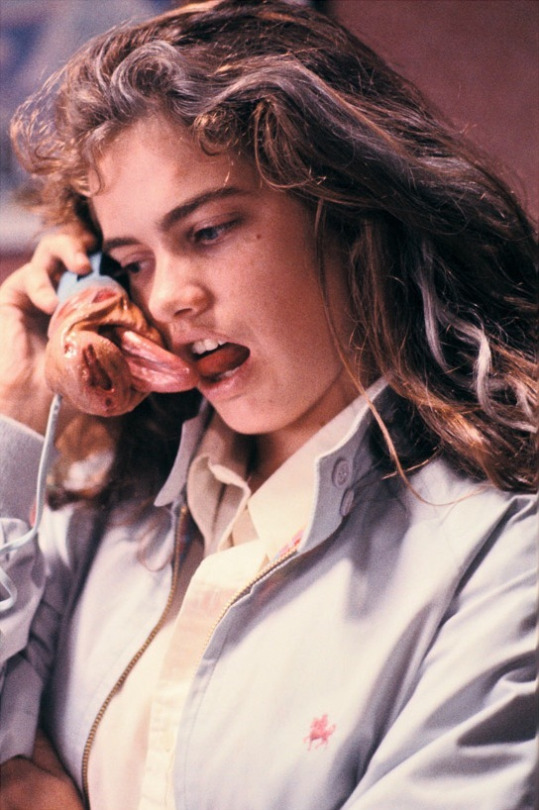
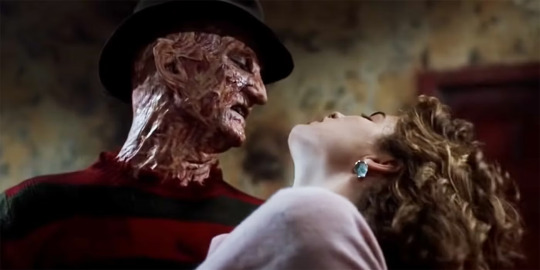
It isn't like the idea doesn't have support in the text! Like look at them? You mean to tell me that they do not have the capacity to hate-fuck the shit out of each other? There is 100% a lot of complex feelings on both sides of reliance and need and hatred and wanting to destroy the other but still getting something out of what they share with an overall refusal to acknowledge it because they are both so stubborn!
The whole thing, in short, is very, very sexy and I love that for them.
#Listen if you ask who I ship with Freddy#The answer is me and Amber and all my friends ocs and also of course NANCY#I don't care I do!#I can not and will not ever be over the slasher and final girl being entangled and in a fucked up toxic relationship#It's TOO GOOD#BHF asks#Hope this is what you are looking for
36 notes
·
View notes
Note
The Talmud is a record of discussion and debate across centuries were contributors recorded on the same folio might be writing centuries apart, not to mention the commentary and the source reference/topic being discussed.
The Talmud is not a record of legal decisions or interpretation, though it is studied to inform legal interpretation. The most authoritative set of legal interpretations are the Shulchan Aruch and the Mishneh Torah, but Jewish law is always evolving.
But!!! Jewish Law is tribal Law, not religious law... Sometimes the law pertains to religion.
If you study a folio a day of the Babylonian Talmud, it will take you almost 7 and a half years, understanding the structure of the Talmud folio is a craft in itself.
There is no stream of Judaism in the world that endorses those who worship Powers other than HaShem as a part of the tribe. It is the first and most foundational principle of our people. We are happy to be one people of many. We can accept and even celebrate that our G-d might not be the only god, and that others worship differently. We accept that our people doubt or disbelieve, or have conflicting concepts of the Shekinah. An atheist Jew is no challenge to Jewish culture, Atheists lead our synagogues and contribute to Jewish cultural philosophy.
But WE do not have other gods, and to have other gods is to be something other than a Jew. It is Foundational to our culture.
Look, I find it difficult to respond seriously to you. You must recognize, on some level, that citing 12th and 16th Century religious law is not particularly persuasive to a person who has already identified himself as a militant atheist. Why not just quote the Diamond Sutra, or the Hadiths, or the Summa contra Gentiles? These are all equally nonsense. Interesting as a subject of historical study, interesting as cultural artifacts, but totally out of place in the modern world and no basis for any kind of ethics and certainly no basis for a legal system.
Now, I am perfectly happy to grant that you are allowed to bar non-believers and idolators from your particular branch of religion, or to exclude them from your religious services. I have absolute contempt for this kind of religious person, but I don't think this is a problem. But as you know, Jewishness is not defined by religious observance alone. Jewishness is an ethnicity and it is a culture, just like Irishness is, and unfortunately for you, you don't get to ban people from their ethnicity or their culture over differing opinions.
This is all boils down to more special pleading (the favorite activity of the Zionist). You are claiming that, unlike all other ethnic cultures, Jewish culture is defined by a specific, religious belief: there are no gods other than HaShem.
This makes you no different than somebody claiming that you can't really be Irish unless you're a Catholic, or claiming that you're not really an Arab unless you're Muslim. It makes you a run-of-the-mill bigot. It makes you just another religious fundamentalist among all the others.
And the kicker! Is that the Israeli government doesn't even back you on this. The Israeli government does not define Jewishness according to halachic law, since they allow people to trace descent from either the mother's or the father's line. You're really going to tell me that you believe some large portion of those who make aliyah are fake Jews? I haven't been able to find an avodah zarah exemption in the Israeli citizenship laws, but maybe I just haven't looked hard enough.
You don't actually believe any of this, of course. This whole digression over idolatry and Seder Nezikin and avodah zarah is secondary to your true conviction: that anti-Zionist Jews are fake Jews. The fact that your stance very obviously contradicts the entire Israeli project of Jewish settlement doesn't matter, because in that context you'd never think to even raise the objection. A Zionist Jew practicing Wicca is perfectly fine.
It's only when it comes to anti-Zionist Jews that you reach for the rationales to discredit them. It's the same way that Norm Finkelstein can be discredited for transphobia or "Holocaust denial," but you'd never dream to try and discredit Yair Golan for openly calling to starve Gaza. Zionism, no matter what, is the defining feature of Judaism in your eyes. This is obvious to the rest of us, even if you keep it hidden from yourself.
There's nothing much to respond to in your second ask, other than more outpourings of dark age religious bigotry, so I'll end here. From the river to the sea.
3 notes
·
View notes
Text
scene ²⁴

y/n has had just about enough with the general public and their inability to keep their thoughts and opinions to themselves. park jisung likes to think he's living his best life, which he kind of is. park sunghoon likes to portray himself as someone calm and collected, someone who has their life together; he likes to pretend he’s everything he's not. luckily, sim jaeyun seems to be with him every step of the way.
WARNINGS: swearing, mild violence, stereotyping, queer characters, emotional vacancy (she can't express her emotions well, outwardly), jay is definitely presented as the bad guy so be warned, a lot of feels, identity crises (not really?), inappropriate jokes (sexual and worrying *cough* eg. ED/binging, alexithymia *cough*), etc.
TAGLIST: @prettysung @polarisjisung @spiderrenjunfics
♡♡♡♡♡♡♡♡♡♡♡♡♡♡♡♡♡♡♡♡♡♡♡♡
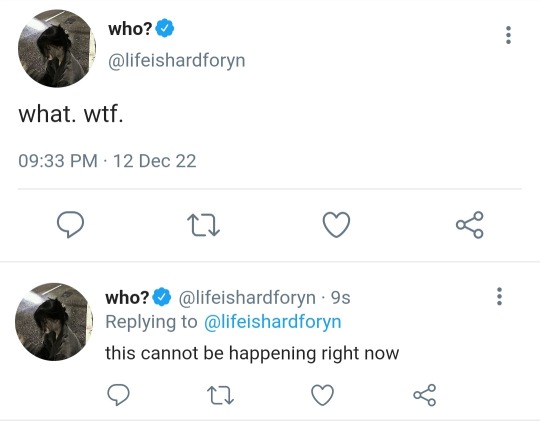
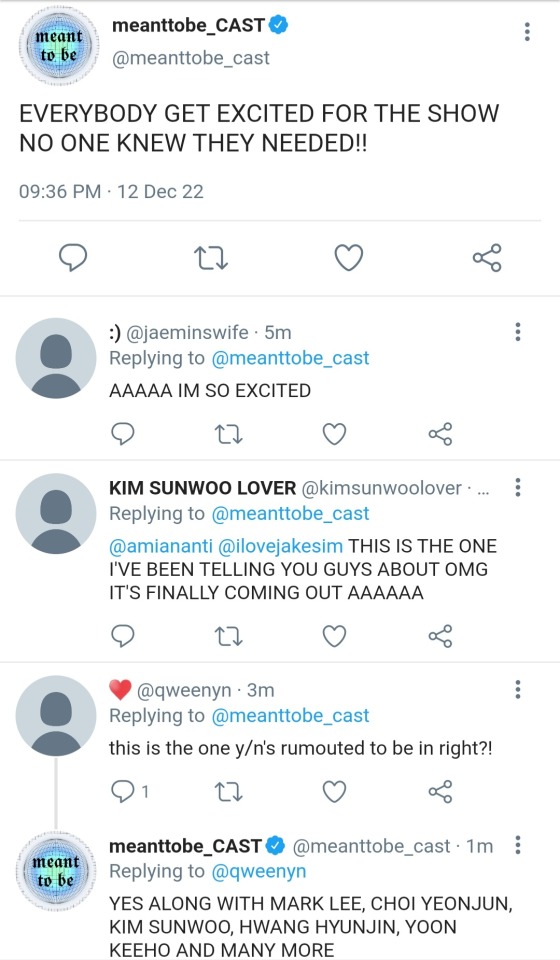
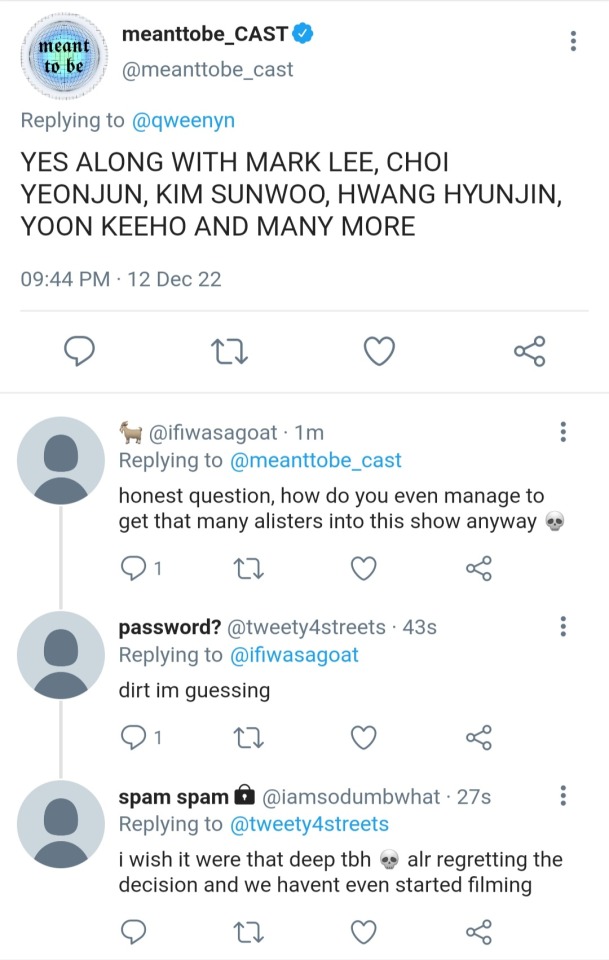
♡♡♡♡♡♡♡♡♡♡♡♡♡♡♡♡♡♡♡♡♡♡♡♡
“sunoo, what role do you think i play in the group?”
the boy pauses from where he’s tapping away at his phone on the bed opposite him, turning to look at him as he tilts his head in confusion, “what? you’re obviously the visual.”
“huh.” and then he’s getting out of bed and walking into the kitchen as sunoo continues to stare him down before shrugging to himself and going back to whatever he was doing on his phone at this hour.
1:26.
park sunghoon doesn't know what he's doing anymore.
the past he had worked so hard to hide was now laid bare, visible to anyone who wished to see it. and everyone did.
no matter how hard he worked, he was back to square one. the retired ice skater, the one who used to skate, ice prince. all that effort, and still nothing.
the identity he had worked so hard to build from scratch came tumbling down in a matter of milliseconds, falling to his feet, peppering his jeans with ash and dust, and his soul with cuts that don’t want to heal.
he wanted to scream, to yell, to rampage because what the hell did he do wrong?! he had spent a whole year in America, had gone and turned into ‘benjamin park’ and yet, no one knew of that. not a single soul that claimed to know him so well and care for him so much. not his fans, not his band, not even his company.
sure, he had struggled, and it was a little embarrassing that he had spent a whole year there and yet he still couldn’t speak even a lick of the language, couldn’t communicate with anyone or even order an americano without messing up and having to pretend he meant to order whatever the hell he did. yet, it was one of the best periods of his life. he had been able to breathe after god knows how long, and he had found someone who could understand him even when he couldn’t understand himself, and he didn’t even need to know the language to understand how special that was. what he had with you, has with you… hopefully.
and yet, he had left. Left the safety of you, and your presence, and your you-ness, to this. to people who knew him for his face and his skates. to breathlessness and home. to his family, to the media, to everything he loved and couldn’t fucking stand. he had stopped ice skating two whole years ago, and yet, it meant everything to everyone around him. he had spoken on the topic numerous times, had told people over and over, and nothing.
"to be honest, what I really think these days is that I've done quite a lot related to ice skating since the debut. So maybe the time has come to finally say goodbye. After all, I'm not a figure skater anymore – I'm Sunghoon from Enhypen. And as a member of Enhypen, I really want to show a new side of myself." He had plucked up the courage to say in one particular interview, only to be awkwardly brushed off and to later find that they had scrapped the whole section out of their video.
Sunghoon didn't really know what to think anymore. Was it really worth it? Busting his ass in this profession, spending hours upon hours trying to improve when all anyone ever cared about was his past. A past he had buried alive to keep himself alive. A past that everyone loved digging up and inspecting.
A tap turned off and sound of water gushing onto metal stopped as Sunghoon stepped into the kitchen, dazed and blank-faced – an expression his whole group had already gotten used to by now.
“Sunghoon?” a voice called out gently, causing him to tilt his head and make eye contact with his young leader. His little everything.
“Hey, won.” the elder replied, just as gently, as he reached up to ruffle the boy’s hair.
“What’s got you so upset?” the boy hums, closing his eyes and leaning into the touch.
Sunghoon grins, sharp canines coming into view as he marvels at the boy’s resemblance to a kitten, “i’m not upset baby.”
And then he’s instantly hit with the reality that this small boy is a black belt in taekwondo and a little too good at faking the whole ‘soft boy’ act. Because, before he knows it, he’s crouched on the ground, arm curled protectively around his stomach as yang jungwon stands in front of him with crossed arms and an adorable scowl set into his features.
"Don't lie to me. I hate liars." The boy reprimanded
"I'll never tell." The older boy wheezed out from where he was practically rolled up on the floor in front of him. "never."
Never. You don't deserve that.
♡♡♡♡♡♡♡♡♡♡♡♡♡♡♡♡♡♡♡♡♡♡♡♡
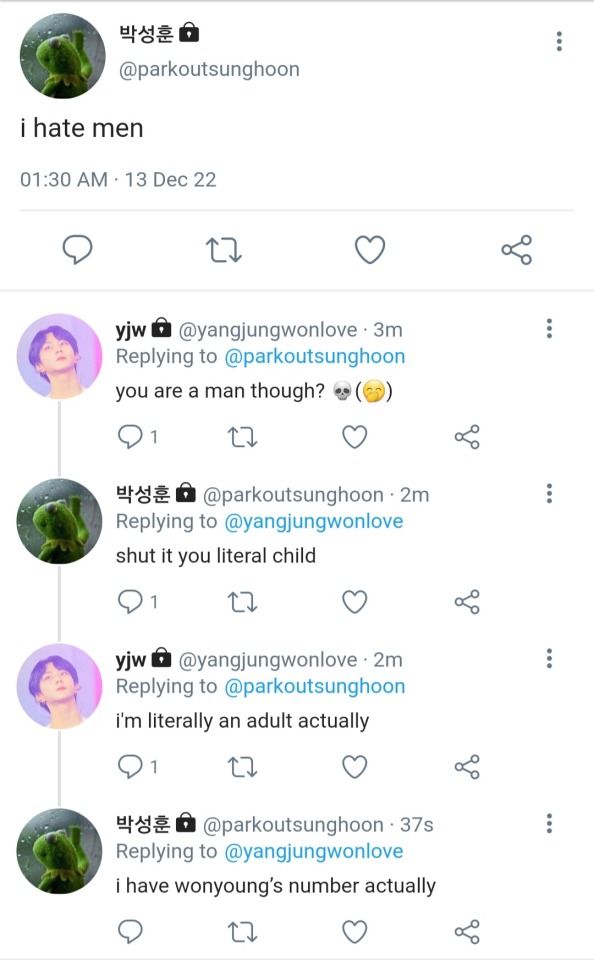
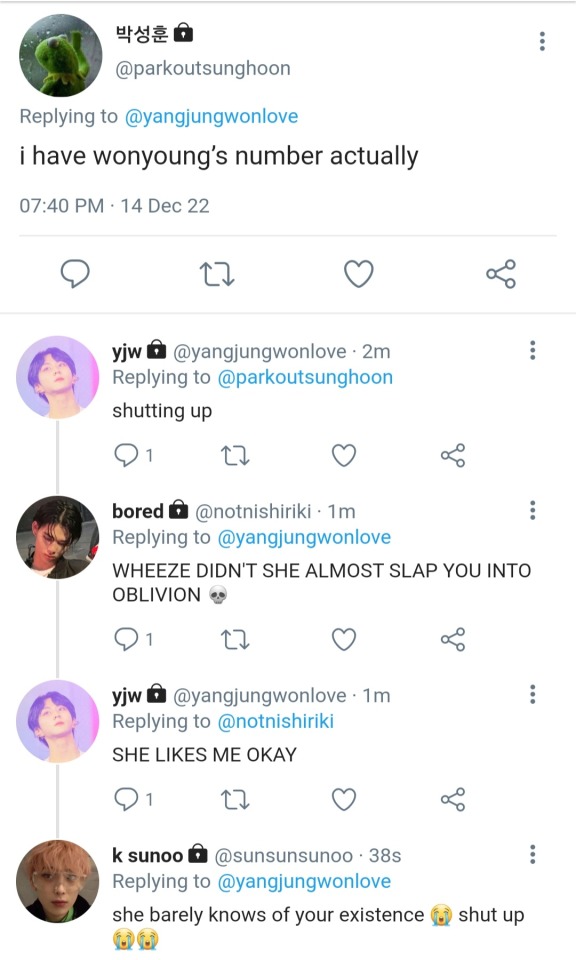
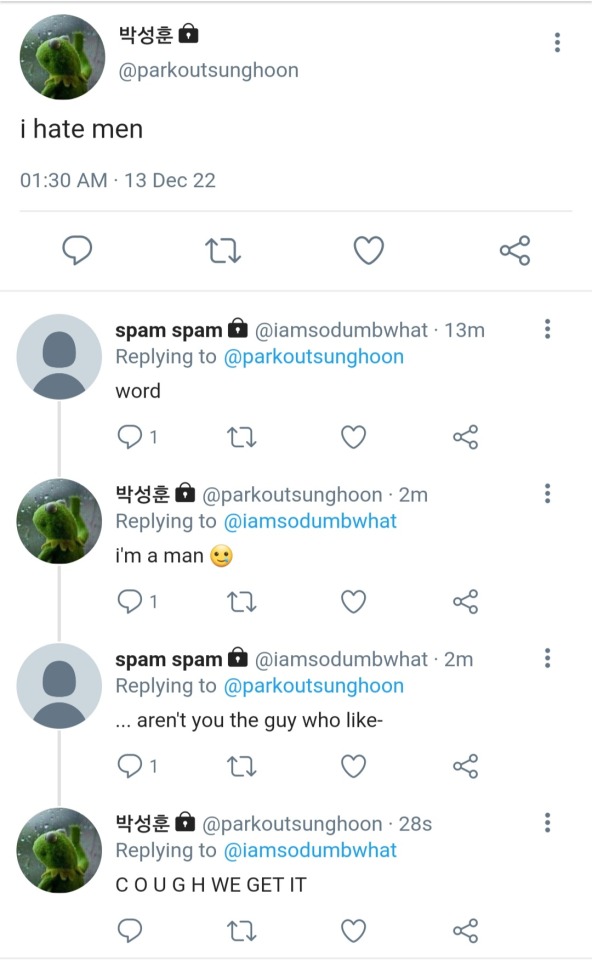
♡♡♡♡♡♡♡♡♡♡♡♡♡♡♡♡♡♡♡♡♡♡♡♡
prev | masterlist | next
#nct#enhypen#nct dream au#nct fanfic#nct imagines#nct fluff#nct dream#nct scenarios#nct u#nct au#nct drabbles#nct dream imagines#nct dream scenarios#nct dream jisung#nct dream park jisung#park jisung#jisung park#jisung#nct jisung#jisung fic#jisung x reader#jisung fluff#enhypen scenarios#enhypen imagines#enhypen social media au#enhypen fics#enha#park sunghoon#yang jungwon#kim sunoo
23 notes
·
View notes
Text
In Pursuit of Intellectualism
While I'm no longer a teacher, I still hear from some of my former students from time-to-time informing me about their studies, asking questions, or with words of gratitude. This one in particular hit my inbox with an intriguing question today.
Would love to hear YOUR opinions on the topic, too!

STUDENT'S QUESTION: Do you think America is more anti or pro intellectual today ?
"Short answer: Yes. America is INCREASINGLY anti-intellectual.
Long answer: Kind of. There are a lot of nuances that don't allow the matter to be so easily defined. Like most issues (racial, social, sexuality, etc) there are things that are better and things that are worse when it comes to intellectualism.
On the side, our country is increasingly MORE educated as post-secondary education is kind of a requirement for most job fields but education isn’t necessarily intellectualism. While college used to be all about intellectualism it has now devolved into glorified job training. University used to be about pursuing knowledge for the sake of knowledge, gaining a broad understanding of a wide array of specialized concepts, and a free-discussion of differences in opinion; that is simply not the case in the modern day. Most students are forced to go there by parents, have a fear of future debt (and therefore don't want to spend extra time there), and face a VERY polarized world which doesn't truly value critical discussion.
We also have the wealth of human knowledge at our fingertips and searchable within a few keystrokes, but fewer use this in an intellectual way than use it purely for self-gratifying entertainment. While there is nothing wrong with people choosing to use their time in the way they see fit, echo chambers, social media bubbles, and disinformation make the average person ill-equipped to advance their own intellectualism unless they have been trained to do so which education/society are not great at possible because a pacified populace is easier to rule than a thinking one.
Education is NOT interested in intellectualism in the modern day. While individual teachers take up this mantle and do the best they can, the system wants docile test-takers who think in a formulaic fashion so that their thoughts are equally formulaic which, unfortunately, turns those interested in furthering intellectualism off. In my 12 years in education, I witnessed the degradation of the public education system at the expense of quality education, meaningful discourse, and student growth. There are a million reasons for this (most political, sadly) but at the end of the day, education is a business that employs many people and is focused on public image and metrics rather than actually promotion intellectualism and therefore will be maintained no matter the cost to society.
Finally, it’s no secret that I’m not a huge fan of any body that seeks to tell people “truths” about “myth” in order to control their behaviors and thought. And while religious ideas (“God”, order to the universe, rules of decency) are a wonderful concept, the pushing of them at global and governmental levels is damaging in my opinion. Organized religion is, at its root, anti-intellectual (believe the text, what the “teacher” of it says, or bad things will happen) and since we indoctrinate youth regularly to it (against their will) it is one of the leading factors of our anti-intellectual society. If you are taught that every answer goes back to “because God” that IS anti-intellectual.
So, yes. A LOT has changed since the 80s, some good, some not-so-much. But isn’t that human history? We tend to think of the world as a steady progression from “dark ages” to enlightenment but I look at it as more of a dense fog that becomes a little less thick over time yet never fully lifts. While old problems have improved, new ones have stepped in to replace them and none of them ebb or flow at consistent rates."
#anti intellectualism#questions#teachblr#liquid modern#intellectualism#former students#intriguing questions
10 notes
·
View notes
Text
I liked the conclusion of Lucifer. I'm especially happy for Dan and Maze because they sure as hell deserved it.
As for Chloe and Lucifer, it goes beyond bittersweet, for sure. Frankly speaking though, ever since season one, I had a gut feeling that Lucifer would end up taking charge of hell again. I couldn't picture Chloe and Lucifer living as a happily married couple on Earth - maybe Lucifer even being a mortal. But so was Lucifer becoming god for what it's worth. I didn't expect Rory and time traveling at all though and I'm not going to get into if they had to go about it that way.
And yes, free choice was a major and important topic on the show for Lucifer. But so was taking responsibility and putting others first, at least occasionally. Based on my observation.
Someone had to take that responsibility and considering who Lucifer has become, it is reassuring to know that he is the one. Leaving hell without a capable person in charge is not an option, otherwise a lesser person uses it to cause havoc. There is a discussion to be had whether all people in hell deserve to be relieved of their guilt (a concept that has its holes to begin with) and whether its true that if this particular devil can become a better person, everyone can. Since I find it hard to believe that Lucifer committed every crime hell has to offer. But I'll leave that be. At the end, even though it is certainly not easy for Lucifer, it warms my heart that he uses what he learned on Earth to make a change. And yes, there is an argument to be made that it is unfair that Lucifer ends up at the place he ran away from and didn't want to go back to, that Lucifer lost, basically. But I don't think that's entirely true.
All that said, it doesn't mean it isn't sad to me Lucifer was seperated from his family and friends. We know Chloe eventually joins him in hell, but it's unclear if sometime in the future Rory can meet and reconcile with her father without disrupting that time travel thing. Or everyone else for that matter.
Anyway, in my opinion, there is room for endings like these, even if they hurt. It felt natural to me.
Thinking back, I was less than impressed with season one and had decided that Lucifer wasn't for me. I'm glad I gave it another shot on a whim because now it feels like something special to me. It isn't the best, there are things I'd like to have seen, explored more or things I think could be improved. But most importantly: The characters really grew on me. I liked them, even when they made grave mistakes or bad decision. The main ones are all just very endearing to me, you know which I mean, I don't have to name them all.
#lucifer season 6#lucifer spoilers#lucifer season 6 spoilers#lucifer#lucifer tv#lucifer netflix#lucifers6#wolfishwords
3 notes
·
View notes
Text
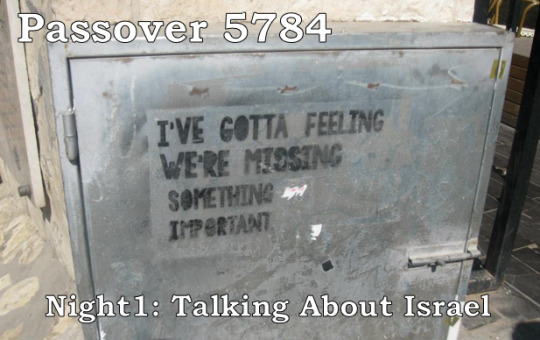
Passover 5784, 1. Talking About Israel
(Originally posted this to Facebook, realized I could also share it meaningfully here, so catching up with this post)
Disclaimer: This is part of a series of posts on the topic of Israel and Palestine. You are welcome to engage with or share the thoughts expressed herein, however they are ultimately my own personal thoughts and lived experiences and not the word of an expert on this, or really any matter. I speak as a Jew, but neither I nor anyone else can speak on behalf of all Jews. All pictures used as headers are my own, taken in Israel in 2015.
Hello friends, here I am doing another series of posts, I guess this is just how I express myself these days. Passover is upon us and it just feels right to take it as the opportunity to attempt to get out everything that’s been bottled inside under increasing pressure. Part of the struggle in articulating my own thoughts is that they aren’t that cohesive, making a weeklong series of posts on separate but related topics ideal. Passover is also arguably (as most Jewish things are definitively arguable) the most important Jewish holiday, explicitly concerned with identity and liberation and I am sure my voice won’t be the only one peaking up for the occasion.
For the first topic, and the one I’m using as a warm up, I’ve decided that to start talking about Israel, I need to talk about talking about Israel.
A facet of the Jewish experience you rarely hear about is how much people want to talk to you about Israel, even as a small child. You would think this might generally pull one towards being very knowledgeable on the subject, or at least adept in fielding such questions, but for me it was quite the opposite. I think it has to do with context. People don’t ask me about Israel the way they do, say, about languages.
When people asked me about languages it’s because they know I have a degree in linguistics, or are otherwise aware it’s a special interest. The decision is based on knowledge of me as a person, and I can tell when the intent is to either seek my input or to delight me in the telling.
Conversely, when people, especially strangers, ask me about Israel they do it because of a label, an assumption based on my ancestry that I have any insight or interest in uncomfortable questions of a geopolitical and humanitarian nature about a foreign country (I’ll save the topic of heritage and nationhood for another post). They are almost always obviously someone either using me as an excuse to voice an opinion or someone trying to gauge me as a friend or foe.
Not only did these questions make me uncomfortable but, as it turns out, a 12 year old boy from Texas who had barely formed his own political opinions had very little to say on the matter anyways. I didn’t really have much more to say to random kids in high school or when I was 21 in a night club in England and some strangers noticed I was wearing a brimmed hat and have a beard (neither of which had or have anything to do with my Judaism). To date, I can think of only one larger faux pas; when a man, who was my boss at the time, immediately asked me about Jews for Jesus, an appropriative Christian Evangelical missionary movement.
This disinclination hasn’t been helped much by the fact that across the American political spectrum there is now a demand for Jews to pass Israeli loyalty tests. I’ll leave this, as well, to be fleshed out in another more dedicated post, but I’ll end this particular thread with this: it’s not that it’s somehow wrong to ever talk to Jews about Israel, in fact I do think it would be much more wrong to try talking about it without ever seeking a Jewish angle. But it is wrong to assume that someone can, or even wants to talk about Israel just because they are Jewish. It is outright anti-Semitic to demand that Jew tell you their thoughts and allegiances to Israel in any circumstance you would not earnestly demand it of a non-Jew.
Now, if you’ve ever attempted to avoid something most of your life, be it something small or larger, or be it something you do consciously or unconsciously, then you probably already know that this actually results in new and exciting ways for that exact thing to become unavoidable. And so here we are, a lifetime of frustration burst by the pressing weight of ethical need against the therapeutic requirements of my aging psyche. The subsequent articles will probably be more topical, though I can't guarantee they'll all have a cohesive thesis or narrative. As it says in the disclaimer, these are, ultimately, just my thoughts.
1 note
·
View note
Text
Splatoon 3 Anniversary Splatfest - Thoughts and Data
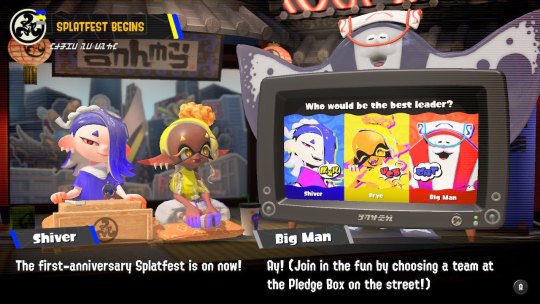
Earlier this month, Splatoon players from across the globe were faced with an imposing question: Who would make for the best leader of Deep Cut?
The question, like many others in-universe, could only be answered one way: through a Splatfest.
A Splatfest, for the uninitiated, is a large sporting event in which combatants take part in Turf War to fight for their opinion on various topics. It can be thought of at the scale of the World Cup or the Olympics—events that are inseparable from the lives of the player characters. They're held at a rate of approximately once a month.
This one in particular was special, since it began one year after the game's initial release in September of 2022. As such, the trivial topics of "Which Chocolate is the Best?" and "Which Urban Legend is Real?" have been ditched in favor of a more imposing question that will impact the overarching story of the Splatoon franchise.
So, instead of having the members of Deep Cut be representatives of an opinion, this time they're representing themselves, in an all-out-war to see who makes for the best group leader.
But What's Turf War?
Turf War is a timed competition in which two teams of four battle it out to gain the most Turf. This is done by "inking" the ground with as much of your team's color as possible.

Here is a picture I took from one of the 22 fights I participated in this Splatfest. I was on the yellow team—Team Frye.
While we're here, I may as well explain who Deep Cut is. Deep Cut is a fictional band composed of the three characters shown below. From left to right, they are Shiver, Big Man, and Frye.
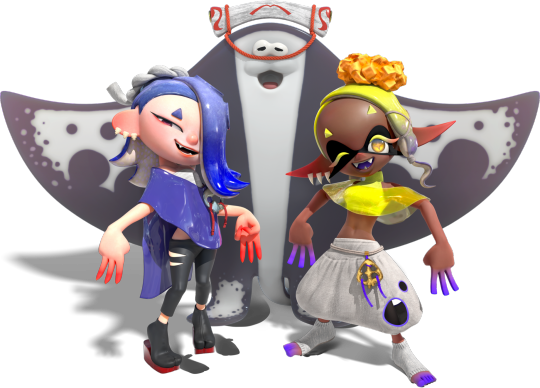
In the Splatoon world, the winner of the Splatfest is considered to be the de-facto answer of the imposed question. Since Team Shiver won the event, she is now heralded as the leader of Deep Cut.
Personal Experience
This Splatfest, I participated in 22 matches. And quite frankly, I had a ball!
One of the most imposing problems with Splatfests are Mirror Matches: matches in which you fight against members of your own team. These are held in order to speed up matchmaking, but even so, players like me can't help but feel a bit defeated knowing that the final result will be the same no matter which side wins.
Splatoon 3's solution to the problem has been to make Splatfests three team events: previous entries of the franchise had only two teams to choose from.
And so far it has worked—kind of. See, the three-team split works well when the options feel equal, but sometimes one of the members is given the short end of the stick when it comes to options. The "Which Flavor of Ice Cream is the Best?" Splatfest comes to mind:
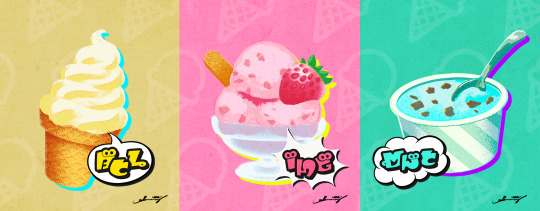
How are strawberry and mint chocolate chip supposed to contend against vanilla? It seems rather thoughtless.
This Splatfest, however, felt quite evenly split—at least as a member of Team Frye. I only had one mirror match, which, considering I played 22 of them, is really good.
I also had a pretty even split of wins and losses. It's definitely discouraging to have a string of losses in a row, but I never felt like one team was too overpowered against the others.
The Data
With this fest, I decided to do something I've never done: collect data on every match I played. Behold!:
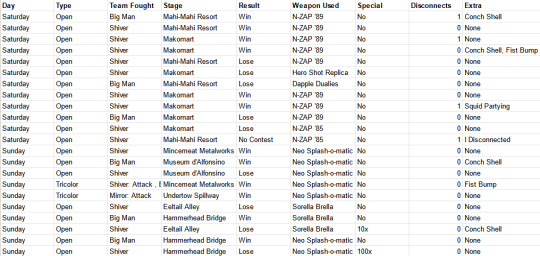
If this image is a bit too small for your liking, you can check the full data here.
A lot of this data might not make sense unless you're a Splatoon veteran, so I went ahead and made some charts of the more important points:
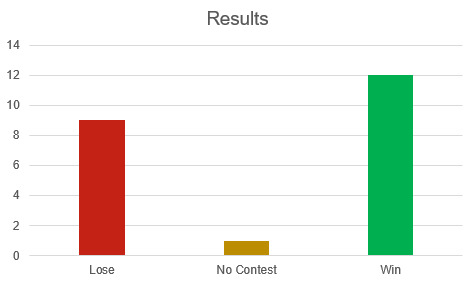
Out of 22 matches, I won 12, lost 9, and one match I did not get to finish because of an in-game error.
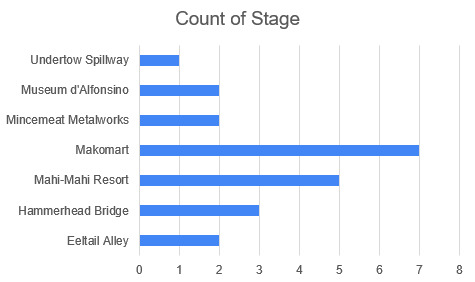
The Stage (in-game equivalent of a sporting field or arena) I played on the most was Makomart: a grocery store with a large playing field at its center. Who knew a grocery store is where we would be deciding the world's most important questions?
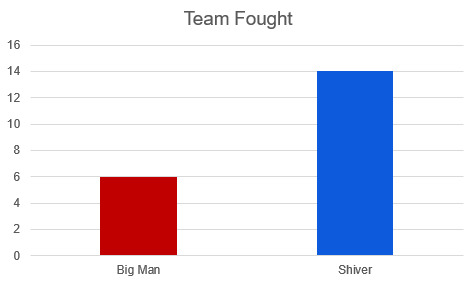
And out of 20 regular matches (the remaining two were Tri-Color, which is a subset of Turf War with even more complex rules) I spent 14 of them fighting Team Shiver, and 6 of them fighting Team Big Man.
Final Thoughts
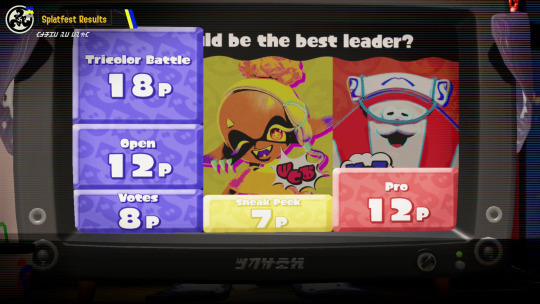
With how many Team Shiver opponents I ended up fighting, it's no wonder that she ended up winning.
Am I a bit disappointed? Yes, I am. Back when I was fighting, I truly thought the odds had been a lot more even. Shiver swept, as one might say, and I truly wish Frye and Big Man had had a bit more points to take home each.
Shiver has also had quite the winning streak. In the events where she doesn't have a super-favorable team (such as the Ice Cream Splatfest), she usually ends up winning anyway as a result of her sheer popularity.
At the end of the day, however, it's all just a game. There's no real reason to get salty over it. After all, there's always next time.
Here's hoping Frye gets a second win soon!
1 note
·
View note
Text
What is Call for Papers in Law Journals?: Elevate your CVs
This article on 'Call For Papers For Law Journal: What Is It And Why Is It Important?' was written by Shruti Pandey, an intern at Legal Upanishad.
Introduction
Law journals are an important part of the legal academic community because they provide an opportunity for legal scholars, practitioners, and students to publish their work, engage in scholarly discussions, and contribute to the growth of legal thinking. At the heart of these journals lies the "Call for Papers" (CFP), a vital mechanism that invites submissions from the legal community to address a specific theme, topic, or issue.
This article discusses the significance of the Call for Papers in law journals, exploring its purpose, benefits, and contributions to the advancement of legal scholarship.
What is 'Call for Papers' in Law?
A 'Call for Papers' is an invitation extended by a law journal to legal scholars, researchers, practitioners, and students to submit their original research, analyses, and opinions on a particular legal subject. This process aligns with the academic pursuit of creating and disseminating knowledge, allowing contributors to share their insights, perspectives, and findings with a wider audience.
Purpose of the Call for Papers
Knowledge Expansion: A Call for Papers prompts contributors to delve into specific legal issues, encouraging in-depth research and analysis. This process promotes intellectual growth and facilitates a deeper understanding of complex legal matters.
Identification of Emerging Trends: By specifying a theme or topic, law journals use Call for Papers to identify emerging trends and relevant issues within the legal field. This helps direct scholarly attention to subjects that require further exploration.
Diversity of Perspectives: The call encourages scholars from diverse backgrounds, legal traditions, and geographic regions to contribute their viewpoints. This diversity enriches legal discourse by offering a broader range of insights and experiences.
Encouraging Young Scholars: Calls for Papers often present opportunities for young scholars and students to showcase their research skills and innovative ideas. This can be instrumental in launching their careers in legal academia.
Stimulating Dialogue: Legal discourse is advanced through scholarly dialogue and debates. Call for Papers fosters such dialogues by creating a platform for legal professionals to engage with one another’s ideas, critiques, and responses.
Contact Us and avail the best assignment help for students available online!
Benefits of responding to a Call for Papers in Law
Publication Opportunity: Responding to a Call for Papers presents a chance to have one's work published in a respected law journal, granting visibility and recognition within the academic community.
Networking: Successful submissions to Call for Papers can lead to connections with peers, established scholars, and practitioners in the legal field, fostering collaboration and knowledge-sharing.
Contributing to Legal Scholarship: By contributing to a Call for Papers, scholars play an integral role in shaping legal scholarship, generating new insights, and influencing the development of legal theories.
Contribution to Practice: Practical implications of legal research are vital. A Call for Papers allows researchers to bridge the gap between theoretical concepts and real-world applications, benefiting legal practitioners.
Important Call for Papers in Law: You Must Know
LU Journal: LU Journal, a prestigious academic publication, is excited to announce its call for papers for its upcoming issue. As a leading platform for scholarly research, LU Journal aims to foster intellectual discourse and promote innovative ideas across various disciplines. This call for papers in law invites researchers, scholars, and practitioners from all fields to submit their original and high-quality manuscripts for consideration.
Whether you specialize in international law, criminal law, corporate law, or any other related field in law, LU Journal welcomes submissions that contribute to the advancement of knowledge and understanding. By submitting your work, you have the opportunity to showcase your research to a global audience and engage in meaningful academic conversations.
Don't miss this chance to be part of LU Journal's esteemed community of contributors. Visit lujournal.com/call-for-papers/ for more information on submission guidelines and important dates.
Impact on Legal Scholarship
Advancing Legal Discourse: Calls for Papers spark intellectual debates, challenging existing norms, theories, and interpretations. This dynamic exchange promotes the evolution of legal thought.
Engaging with Contemporary Issues: Calls for Papers enable the legal community to tackle pressing societal issues, such as human rights, technology, environmental law, and global governance. This engagement helps law adapt to the evolving needs of society.
Forming Research Agendas: Calls for Papers influence research agendas by focusing academic attention on specific legal topics. This concentrated effort encourages comprehensive studies and comprehensive exploration.
Conclusion
The Call for Papers process is a foundation of law journal publication, playing an important role in promoting legal research, encouraging academic conversation, and improving legal discourse. By inviting legal professionals to contribute their insights and analyses, Call for Papers empower scholars, practitioners, and students to shape the trajectory of legal thought and contribute to the advancement of society as a whole. Through this mechanism, law journals continue to be vital platforms for the dissemination of knowledge, the exploration of ideas, and the evolution of legal theory.
LIST OF REFERENCES
'How to Answer a Call for Research Papers and Proposals', Medium, 26 July 2017, available at: https://medium.com/@lilianyamongo/how-to-answer-a-call-for-research-papers-and-proposals-1a1b219fbfab
'Advanced Tip: Calls for Papers', University of Central Florida, available at: https://pressbooks.online.ucf.edu/strategies/chapter/cfp/#:~:text=A“callforpapers”(,shouldaddressintheirwork.
Dhiren Ray, 'What does 'call for papers' mean?', Conference Alerts UK, 31 March 2022, available at: https://www.conferencealerts.co.uk/2022/03/what-does-call-for-papers-mean.html
Read the full article
0 notes
Text
Chapter 4: Interview with the Angel
Pamaros pressed an elbow into the roughly hewn rocky arm of its lunar throne, and gestured as if leaning its head on one hand.
It wasn’t, of course – the wispy plasma edges slowly rotating, gyrating, burning eye-wheels-within-wheels ‘head’ didn’t even touch its darkened bronze gauntlet hand – but it orientated it as if pressed into the chin of an invisible skull, containing within it its actual head.
The first question transmitted via the probe that sat in the moondust in front of it came from a representative of NASA, so permitted because they had organized this mission, on a tight timescale and at great expense.
“Is there anything we need to add to our physical laws or understanding of science?”
I WOULD NOT SAY SO.
“…Not even concerning this, spiritual world you’re talking about-“
YOUR SCIENCE HAS DEVELOPED TO DESCRIBE AND EXPLAIN THE PHYSICAL WORLD. WHERE IT BLEEDS – MYSELF, FOR EXAMPLE, OR THE KNOWLEDGE OR SKILLS EXHIBITED BY INCARNATED SOULS – YOUR SCIENCE WILL INEVITABLY BREAK DOWN. YOU CANNOT EXTEND YOUR LAWS TO IT. NO EXTENSION IS NECESSARY. IT IS NOT A FIELD IN WHICH YOUR, MEN OF SCIENCE, CAN SPEAK.
The format of this interrogation was strange, but had been divined by the specially appointed council for the task after only a few weeks of work. Pamaros had told them ‘speak, and I will hear.’ Initial attempts at simply speaking on Earth had not worked, and had in fact made the people standing outside yelling at the moon look quite silly. Despite misgivings, it was ultimately judged that the best course of action would be to land an unmanned probe on the Moon, that would broadcast – what should be – silent speech into the airless void there.
To the physicists’ absolute horror – or in one case, awed joy – they had seen Pamaros on the camera calmly watching the buggy approach its throne, and when they broadcast a hail, received a response that rang deeply in all their heads, a bass thrum at the base of their skull that hummed up into words in their ears and dissolved still up into buzzing signal noise in their scalps.
The next question came from a theologian, of Christian descent.
“Do you serve God, or a god, or gods?”
NO.
“Did you once serve a God?”
…
WHAT IS IT THAT YOU MEAN BY GOD?
“Were you once bound to orders by a higher force? What shape did it take? Tell us of it.”
I AM NOT BOUND.
“I didn’t ask if you are.” This theologian had long exceeded his allotted term, but this particular question had caught the interest of everyone in the room enough to allow it. “I asked if you ever were? Were you created? Are you an angel?”
‘ANGEL’ IS NOT A WORD I HAVE EVER USED TO DESCRIBE MYSELF. IT IS AN, EXTERNAL, DESCRIPTOR.
“So you are not an angel of God, in the sense Abrahamic faiths talk about?”
THAT WOULD DEPEND ON THE BOOK. AND THE. VERSE.
The theologian was getting irritated now. “Sir. Do you serve God as I believe in Him? Are you a Holy being, or something base? Of matter? An extraterrestial, perhaps? From whence did you come? And why-“
.
That final stop was a loud thud into the skulls of everyone in the room. It was a telepathically transmitted period, something like a book slamming shut. They still felt its presence, staring at them silently, but the dark boiling in their stomachs told them it would be a very, very bad idea to push this topic.
The next question came from a lawyer.
“Are the reincarnated the same people as the deceased?”
THAT IS A MATTER OF OPINION.
“If a reincarnated person lives long enough, will they become identical to the deceased?”
NO.
“Will they regain all their memories?”
NO.
“Are they, essentially an amalg-“
“Hey, don’t hog it!”
There was a shout from off camera; someone shoved the lawyer away, pushed their way to the front. The explanatory text on the bottom still showed the lawyer’s name and occupation for a few moment as they started speaking, before showing that they were a diplomat.
“Will you intervene in human affairs?”
I HAVE.
“…More..?”
NO.
“What powers do you hold?”
I AM NOT BOUND.
The next was another physicist.
“I am the reincarnation of the physicist Galileo Galilei. I incarnated twelve days ago.”
I CAN SEE THAT.
“I know things that Galileo would never have known, however. I have received…knowledge, pertinent to fields that were invented long after his death. I have received skills that he did not hold. How can this be?”
I AM A BEARER OF KNOWLEDGE UNTO THE PEOPLES OF THE EARTH. THE DEAD ARE MY. EMISSARIES.
“So they receive this information from you?”
I HAVE CREATED THE CONDITIONS FOR IT TO BE REVEALED.
“Why?”
I CHOSE TO.
“Why did you-“
.
Next, and final, another theologian.
“Is there a Nirvana?”
WHAT DO YOU MEAN BY THAT?
“Some release? From the cycle of reincarnation? An end, to this repeating?”
.
.
.
The angel moved its hand down casually from its ‘face’, so that both hands were placed on the arms of the chair. It lazily raised its other – left – hand.
There was a flash of light like a gunshot, streaking out across the black of the lunar vacuum, and fragments of blown-apart probe went tumbling up out of the orbit of the moon, gone past escape velocity into the sky.
As the billowing clouds of dust settled, the moon’s face was now etched, amongst billions, with one more crater.
Back down on earth, the humans, once they had recovered from the cringe of three sharp telepathic knocks to the skull, that left their guts boiling like they’d been shocked by an infrasound predator’s roar, fell into a furious argument about who had said what, about how they should have asked about karma and sin or hell, about whether they’d angered it with that final question, about what had happened to the probe, and about if that money had all been wasted. This only intensified when it was found – admittedly not to the surprise of many – that their recorders hadn’t picked up a word of what Pamaros had said. Immediately, they began disagreeing on the exact wording of what had been said. Within minutes, several distinct accounts of the interview, to be disseminated to different competing media organisations and different opposed governments and interest groups, had grown up.
But away from this, one scientist – the one who’d smiled in joy when Pamaros’ voice had fallen in through the vacuum, rather than recoiling in startled horror like all the rest – had rushed out of mission control and swung herself onto the balcony outside, to see the pale dimpled penny full moon, hanging bright and ordinary and intact in the sky, same as it ever had been every single previous night of her life, and breathed a sigh of relief.
#fantasy#reincarnation#aleister crowley#blackcomedy#action#indieauthor#goth#literature#biblically accurate angel#angelic#newweird#scifi
1 note
·
View note
Text
(Why) React is a Framework
!! As an immense disclaimer !!
I want to reiterate that this is basically subjective and belongs in the realm of bullshit metaphysics, which programmers are just great at.
Moreover, I don't really care a whole lot about the semantics and haven't been writing react code for about a year at this point. I think you can call it either a library, or a framework, or both!
Nevertheless, I wanted to provide my own perspective on this because I think it's a good launching point for
(Also yes I am this obnoxious with colours, I just love using colours ok)
So what's the problem here?
The first time I was really confronted with this must have been when I was toward the tail end of my coding bootcamp in the early months of 2020 and I decided to go along to a little Javascript conference during the early stages of my tech job hunt.
One of the speakers was giving a talk about the latest exciting things happening with React, which was still new to me at the time as I had mostly worked with Ruby, Rails and vanilla JS.
But in any case, I remember one part of the talk in particular. He quizzed us with a show of hands on whether React was a library or a framework, after which he joked (I hope) that he didn't hire people who thought React was a framework and not a library. Most likely in good fun, but this issue also pops up in the context of serious programming material.
This excerpt from What React is and Why it Matters, for instance, is very explicit in stating React is a Library, Not a Framework.
Moreover, we get a definition which I think captures a lot people's reasoning as to why they don't see React as a full framework:
One important distinction between libraries like React and frameworks like Ember.js and AngularJS is that React is concerned only with rendering the UI and leaves many things up to each project to put together.....React’s choice to be a library has allowed projects to adopt it more incrementally and has left the door open to rapid innovation from the community on various other parts of the stack.
There are other definitions out there, and the point which I'm trying to set up here is hardly special, but there are a couple disagreements I have with the above definition.
Firstly, 'only with' is doing quite a bit of heavy lifting in my view; that's pretty central to what a frontend application is at its core and frankly features such as persistent state and routing aren't really central features of a frontend application in the sense that, well, a UI is.
Secondly, while it is true that AngularJS is more opinionated and ships with CLI build/test tools and routing, it doesn't ship with 'everything' you might need; it lacks app-level state management, as a counter-example. In turn, SvelteJS ships with stores à la Redux, but if you want routing you'll either need another library or to use SvelteKit. As it turns out, a lot of frameworks we accept as such still leave many things up to us, the developers, so then where is the cutoff point that includes these other things but excludes react?
In fact, going back to my time with Rails, what about authentication? That's pretty important to a framework such as Rails, which covers both the frontend and the backend of your application. Now don't get me wrong, it *is* possible to cook up your own authentication solution in house using what Rails provides you, but many will use Devise as I did, or Cancancan, or Pundit.
In fact you might say fuck it and use OmniAuth or some shit so that facebook or google handle your user authentication for you. In fact, on the topic of security and coming back to frontend frameworks, React forms sanitise all text inputs by default. That's... above and beyond just 'rendering the UI' but is also really nice to have because sanitisation requires a ton of care and bespoke implementations are generally avoided (Because XSS can be very crafty).
Thirdly, you can adopt basically anything incrementally if you're brave, or crazy, enough! But for reasons which I'll come back to later, this... isn't really much more feasible for React than for others.
My point being, there are many important concerns a given framework isn't guaranteed to handle, but every framework provides handling for some key concern (in this case, the UI) and then some of the others.
But we're focusing on the wrong thing: after all, what *isn't* a framework by this definition? How do we know when a library... is just a library?
So, what makes something just a library?
>Crowd already booing by this point
I'm gonna just say it. Ahem. A package of code in use in a tech stack is a library, but not a framework, when it can be used without affecting the structure of your program.
The natural response to this is, What the fuck are you on about!? Libraries, after all, are there to share code so we don't have to reinvent the wheel 500 fucking times like we're C programmers in the 80s.
We are at the point where pulling a teensy tiny 11-line library from npm can sink all of web development for a bit. A useful library doesn't just leave an impression on a couple codebases: nay, it lives absolutely and indomitably goddamn fucking everywhere, like earth worms in a rich patch of soil.
But in fact, with most libraries there is another way! Recently I've been reading David Farley's 2021 book Modern Software Engineering which has given me some new ideas; I'm not really one to sprinkle design patterns everywhere for their own sake and I like to keep it simple (stupid!), but I must admit ports and adapters - aka hexagonal architecture - really helps with vital program dependencies in any paradigm.
In the example - for simplicity's sake and because needless to say libraries can get this small and still be relevant - we will consider the absolute heinous khrafstra of a thing that is javascript's standard Array.prototype.sort(). Seriously, look at this shit.

Now, naturally a common use case would be to put in something better! Let's say, for example, that we're in CompSci class territory and we've got a bubble sort that does the job and we have it in a bunch of silly little procedures like this - imagine not just allInOrder, but a whole file or two's worth of processes that can benefit from in-place sorting:

However, let's say we've been gnomed and decide we'd want to use gnome sort. In this case, we would have to put it everywhere we were formerly using bubbleSort...
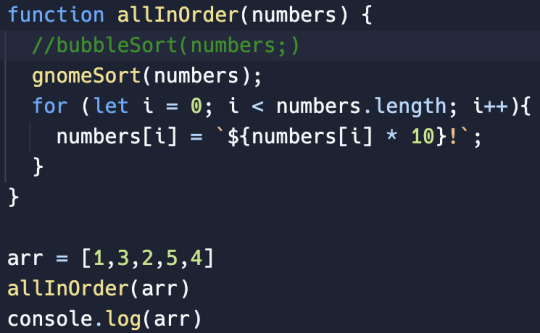
Now, in a case such as this we could just do a simple find and replace for bubbleSort with gnomeSort. But, especially with more complex dependencies and to avoid raking through swathes of the codebase in any case, we could instead wrap our sort of choice:
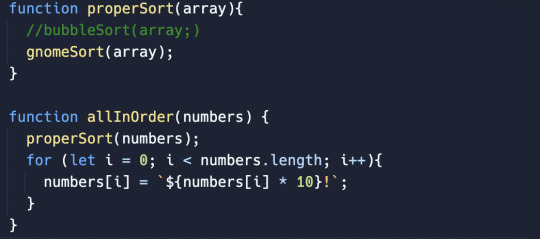
This way, we can gnomeSort, bubbleSort - I mean fuck it, we could put in bogoSort if we wanted! Or maybe, we could use something like an insertionSort or a quickSort or some other algorithm that's actually used in the real world... But we've encapsulated that choice. Thus, we only have to change the internals of one function, and as far as the rest of the code is concerned we're using a proper sort and not whatever Array.prototype.sort() is up to.
Again, just one lil function like this shouldn't usually need to be wrapped in this way, but you can imagine for an entire library the ability to do this really starts to matter!
(There's certainly some old sqlalchemy code I would handle differently today... this sort of thing also helps with dependencies in testing, you see)
If you wrap a major dependency in a module - such as a database client for a given databasing solution, or a set of interactions to a REST API you're using - we can switch said library/API out by reworking that module's internals such that it still satisfies its interface with the rest of the program.
In order words, your program remains loosely coupled with its dependencies.
While you certainly don't have to do this with libraries especially for smaller projects (paralysis by analysis, anyone?), the important part is that you can.
So, how does this all relate to React?
Why React isn't just a library
A framework, however, does fundamentally shape the structure of messages within your code rather than simply living in it, and will do so whether you like it or not.
(Well, most of the time - you can adopt anything incrementally if you're brave enough...).
To illustrate this a little better, let's take a look through Vite's React TS playground. First, we'll start at the index.html:
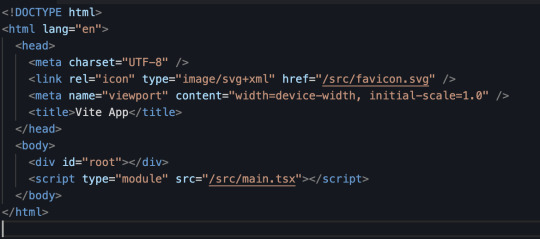
The source of our script is in main.tsx, so we'll take a look at that:
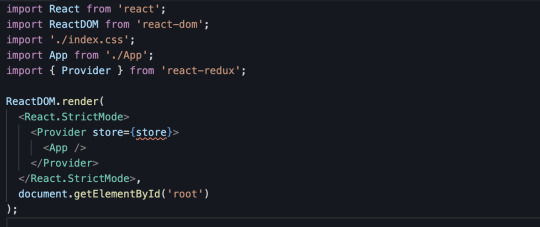
Needless to say, your frontend React project is initialised and runs in the first place via React itself. You take your <;App/> component, wrap it in a couple other things and then pass it all to ReactDOM.render() along with a reference to the root element.
At the very least, all React component code that you're planning on running is going to run under the auspices of APIs provided by React. You can't really encapsulate the fact you're using React from your higher level UI logic to any meaningful benefit, because React is the runtime for all UI code produced with it! I think this is part of the reason why you simply don't see 'incremental' adoption of React into codebases in the wild.
Focusing on React JSX/TSX specifically, a major complaint I've seen with it is that it's entirely non-portable: in virtually all cases you are not simply going to be able to switch from React to something else without having to rewrite the entire structure of the UI.
None of this is to say that this is bad - I've actually quite enjoyed writing JSX/TSX most times I've done it - but to me this isn't just a library. It determines the structure of your code, rather than simply being encapsulated within it.
So what have we learnt?
In my view, a library can be fully encapsulated by your code. A framework, instead, shapes your code. Furthermore, though the boundaries are a little fuzzy, I'd argue that React belongs very much in the latter camp.
#reactjs#react#javascript#framework#frontend#webdevelopment#coding#webdev#software#software engineering#full stack web development
1 note
·
View note
Text
Man 10-year-old me was so pissed at everything but honestly looking back she was so right.
A horrible start to the year. First you got enrolled into a split class without even being consulted. This wouldn't be the first time, but the problem was you'd be learning at a sixth-grade level. It's not like you couldn't do it, you were certainly "smart enough." But you didn't want to. And if either us have learned anything it's that nothing gets done when you don't want to. You begged to be put into a normal year five class with your friends, but you were told many times the school wouldn't relent.
You hated your teacher. She didn't like you much either. You found her condescending. She found you defiant. Now suddenly the doctor, who usually dealt with five-year-olds, was saying you have something called "Autism Spectrum Disorder." Your friend had autism. She confided it to you like it was some dark secret. The teacher didn't like her much either. She went to the "special class." You didn't know quite what it was, but you found the teacher of that class even more condescending than your regular one. Naturally you hated her too. The school gave your doctor a list of pathologically described behaviors. You were infuriated at the insinuation that any of them were a "problem." You didn't know what autism was, but from your experiences, you knew it was a Terrible Thing. You didn't want that label staining you for the rest of your life.
You weren't officially diagnosed for another three years.
I mean, no wonder you thought autism was a terrible thing. Every adult that accused you of it was awful and condescending. You had been so used to your parents treating you like a human being with opinions, and interests, and meaningful things to say; you were infuriated when all these doctors and teachers and therapists treated you like this child who just couldn't understand. You were a child. And you didn't understand. But you deserved something better than the stigmatized explanation you got.
A particular instance stands out in my mind. You were in counseling with your dad. Dad said that the clear cups were easier to wash, so you should use those more often. You tried to counter that if he wanted you to use the clear cups, he should make sure those cups are clean. But the counselor interrupted you, said you should listen to your father, because he is the Parent, the Adult, and he knows Better. You bit your tongue and spoke even less in therapy sessions that you already did. But me? I am frustrated for you. Why couldn't I express my objection to my dad? Why couldn't such a trivial matter be open to discussion? Why couldn't I question such a menial request? It's a terrible precedent! A threat to a relationship that, all my life, has been based on open communication! Do you think I would've questioned the request if I believed such a thing would be unacceptable? My parents are an authority, sure, but not an unquestionable one!
If I knew how to articulate this at the time, maybe I would've. But given how silent I tend to be at therapy... I doubt it. The point is moot now. The plastic cups are all gone, and we have a dishwasher now. But the principle of it is what bothers me to this day. The suggestion that my relationship to my parents should be one of unquestioning authority is unhelpful at best and detrimental at worst.
I've gone off topic. I was going to mention friendships and other things probably, but. I think this is the thing I wanted to get off my chest.
To ten-year-old me, I'm sorry your introduction to autism was one of confusion, of condescension, of stigmatization, and of demonization. I'm sorry you viewed it as something wrong with you, rather than an explanation. I'm sorry your parents didn't know how to advocate for you. I'm sorry you didn't know how to advocate for yourself. I'm sorry you didn't know how to articulate your feelings. I'm sorry the people who were meant to help you only made you resent your diagnosis more. I'm sorry they put you in the wrong class. And overall, I'm sorry you had a really shit 2015.
You totally deserved to be pissed.
0 notes